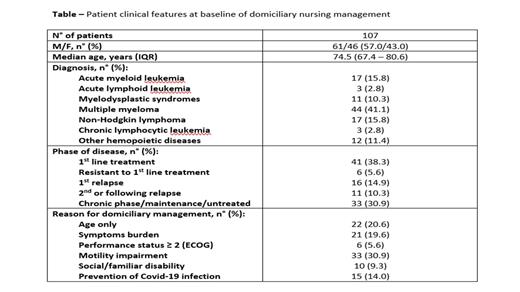Abstract
Introduction In the Viterbo province (3612 Km 2 divided into 60 municipalities) is operative a Domiciliary Hematologic Care Unit (DHCU) for clinical assistance to frail patients (pts) with hemopathies: DHCU nursing activity is done by 4 units who were employed during Covid-19 pandemia to avoid as possible risks of viral contagium due to hospital admissions of our pts.
Aims To evaluate the entity and type of nursing management for frail pts followed by DHCU during the first year of Covid-19 pandemia.
Methods All nursing activities from 3/2020 to 3/2021 in the lockdown framework were analysed. On the whole, 107 pts in 43 municipalities of Viterbo province were followed by DHCU nurses in the study period.
Results Main features of the pts at baseline of domiciliary assistance are reported in the Table. At beginning of the study period (08/03/2020), 37 pts (34.5%) were already followed by DHCU, while 70 pts (65.5%) entered domiciliary assistance during the year of study. Median distance from DHCU central site to pts house was 25 Km [Interquartile range (IQR) 16 - 34]: distance from DHCU was < 20 Km in 32 cases (29.9%), ≥ 20 < 40 Km in 57 (53.2%) and ≥ 40 Km in 18 (16.9%). A total number of 2609 nursing accesses was done in the whole period. According to different procedures, 1152 blood samples were performed, with a median number of 7 (IQR 3 - 15) for each pts: in addition, there were 1040 accesses for chemotherapy (CHT) administration (108 cycles of azacytidine in 15 pts, 87 bortezomib-based cycles in 30 pts, 16 administrations of other CHTs in 2 pts) and 417 accesses for other procedures (260 venous catheter medications, 125 therapy other than CHT, 32 nursing assistances of transfusions or marrow aspirates). Finally, 20 pts were vaccinated at home with respective caregivers. During the entire study period, 2 pts (1.8%) developed Covid-19 infection while in home care. At the last follow-up (31/03/2021), 59 pts (55.1%) were alive and still followed by DHCU, 20 pts (18.6%) were alive and returned to sDay-Hospital (DH) setting due to improvement of clinical conditions and 28 pts (26.3%) died while in domiciliary assistance.
Conclusions Domiciliary nurse assistance during Covid-19 pandemia allowed to follow in a safer way compared to standard DH/ordinary admission settings > 100 frail pts with hemopathies, most of them in 1 st or subsequent active lines of therapy, in a wide geographic area. In our opinion, this approach should represent the best type of assistance for a high rate of hematologic pts even beyond Covid-19 period of pandemia.
Stagno: Novartis: Consultancy, Honoraria, Other: Support for attending meetings and/or travel, Research Funding; Pfizer: Consultancy, Honoraria, Other: Support for attending meetings and/or travel; InCyte: Consultancy, Honoraria. Latagliata: BMS Cellgene: Honoraria; Pfizer: Honoraria; Novartis: Honoraria.


